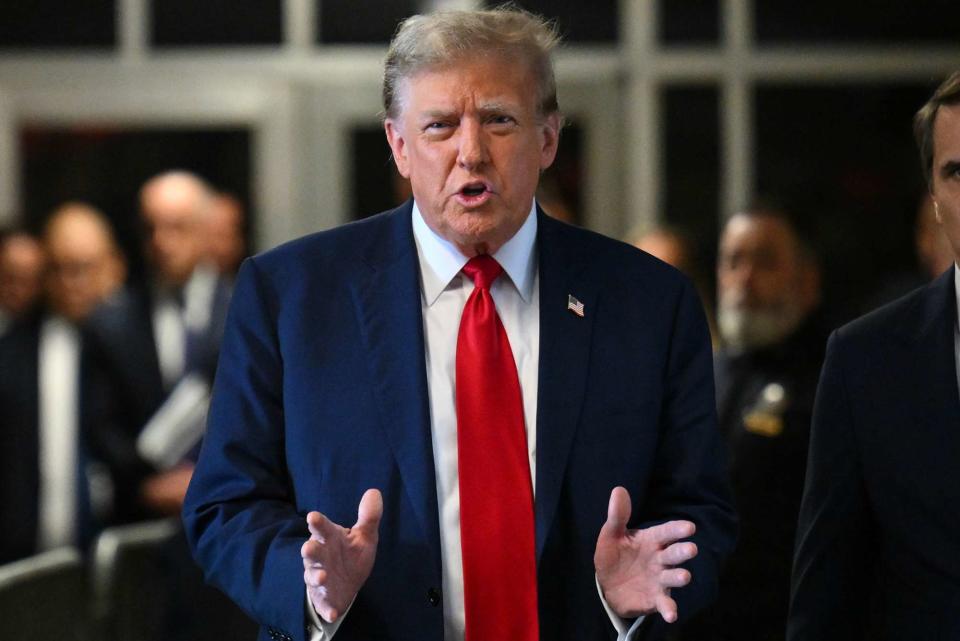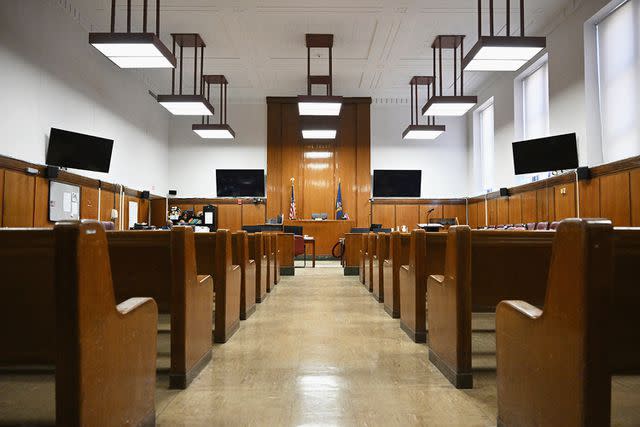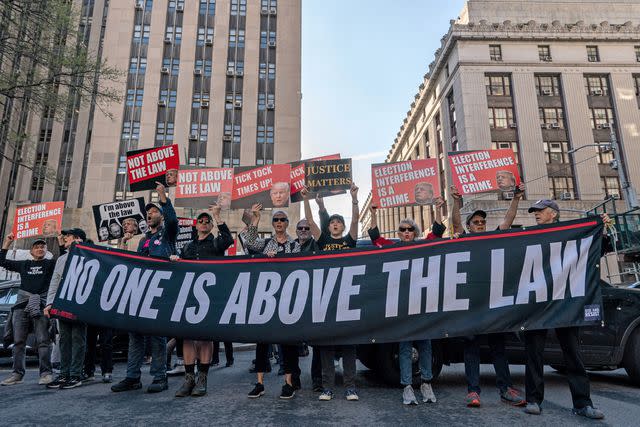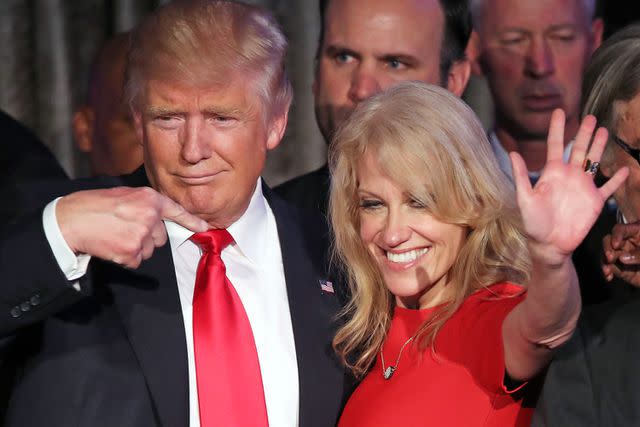Donald Trump Spreads Misinformation About His Jury Selection Process to Cement 'Witch Hunt' Narrative
The former president suggested that his legal team was given fewer strikes than normal for weeding out biased jury candidates in his criminal trial, a blatant lie that overlooks New York guidelines

Angela Weiss/AFP/Bloomberg via Getty
Former President Donald Trump speaks to reporters before entering a Manhattan courtroom on the first day of his criminal trialDonald Trump is getting fans riled up in his defense by pushing a false narrative about how jury selection works in criminal cases.
On Wednesday, April 17, the former president posted on Truth Social that his legal team was not afforded the proper number of strikes to find an impartial jury, suggesting that if his Manhattan criminal trial were fair, the defense would be allowed to send an unlimited number of potential jurors home.
"I thought STRIKES were supposed to be 'unlimited' when we were picking our jury?" he wrote. "I was then told we only had 10, not nearly enough when we were purposely given the 2nd Worst Venue in the Country. Don’t worry, we have the First Worst also, as the Witch Hunt continues! ELECTION INTERFERENCE!"
New York Judge Juan Merchan has recognized the peculiar circumstances surrounding Trump's trial, admitting that jury selection will require careful vetting and take longer than usual. But even in the highest-profile trials, no defense counsel — or prosecutor — has been granted an unrestricted say in who gets on the jury.

Angela Weiss/AFP/Getty
Judge Juan Merchan's Manhattan courtroom, where Donald Trump is on trial for 34 felony counts of falsified business recordsThe jury selection process is known in the legal world as voir dire, when prosecutors, defense attorneys and the judge work together to question potential jurors, identify their biases and whittle down candidates until only the most trusted people remain.
During voir dire, jurors can get sent home in a few ways. First, they can ask the judge to be excused, either because they do not believe they can weigh the defendant's charges fairly or because they cannot afford to take time away from home or work to sit on a jury.
Related: Donald Trump Appears to Fall Asleep in Court During First Day of Criminal Trial: Report
Jury candidates can also be sent home through either for-cause or peremptory challenges.
Striking someone from the pool for cause means the juror has demonstrated a clear bias — perhaps because of their profession, their personal background or their views on relevant issues — that would prevent them from reaching a fair verdict.
Prosecutors and defense attorneys can request an unlimited number of for-cause dismissals, but each must be approved by the judge. That applies in Trump's case, too, and is the primary way that the court will weed candidates out.
Peremptory challenges, on the other hand, are what Trump is referring to when he says that his team only gets 10 strikes during jury selection.
In every trial, the prosecution and the defense are each afforded a finite number of peremptory challenges, meaning they can send a juror home without providing an explanation or requiring approval from the judge.
This type of free pass challenge is how attorneys on each side get some direct say in who sits on the jury — by striking someone who has not technically demonstrated an excusable bias, but whom they fear may sympathize with the opposing side.

ADAM GRAY/AFP via Getty
Protesters of Donald Trump appear outside the Manhattan criminal court on April 15, 2024New York state has clear rules about how many peremptory challenges each side gets based on the size and type of case. For a criminal trial involving class E felonies, which are what Trump is being charged with, 10 peremptory challenges per side fits the state guidelines.
If both sides were allowed an unlimited number of peremptory strikes, impaneling a jury in any trial would prove an impossible task. And in Trump's case specifically, where the former president has argued that he is too famous to receive a fair trial, his legal team could easily strike their way through the several hundred people who were summoned for jury duty just to prove the point that impaneling a trustworthy jury is a lost cause.
Related: Donald Trump Arrives at Manhattan Court for First Day of Criminal Trial: Photos

Trump has repeatedly downplayed his criminal investigations as "election interference," even as three of the four cases against him center around that very issue — including the ongoing Manhattan case.
Trump's current criminal trial — though best-known for its link to Stormy Daniels' hush money payment — is largely about whether a powerful man with similarly powerful friends used unlawful means to tilt the 2016 presidential election in his favor.
The Manhattan District Attorney's Office has charged Trump with 34 felony counts of falsified business records for allegedly mislabeling hush money–related payments as legal expenses on financial documents.
While the charges are white-collar in nature, the district attorney has built a much broader case with more serious implications, alleging that the concealed hush money payments are part of a larger scheme involving campaign finance violations and a collaborative effort to hide damaging information from voters in the final stretch of his 2016 campaign.
If the jury finds Trump guilty on any of the counts, he faces the possibility of prison time. But perhaps more significant with a tight presidential election ahead, multiple polls show that a decent number of Trump supporters would reconsider their support if he becomes a convicted felon.
For more People news, make sure to sign up for our newsletter!
Read the original article on People.


